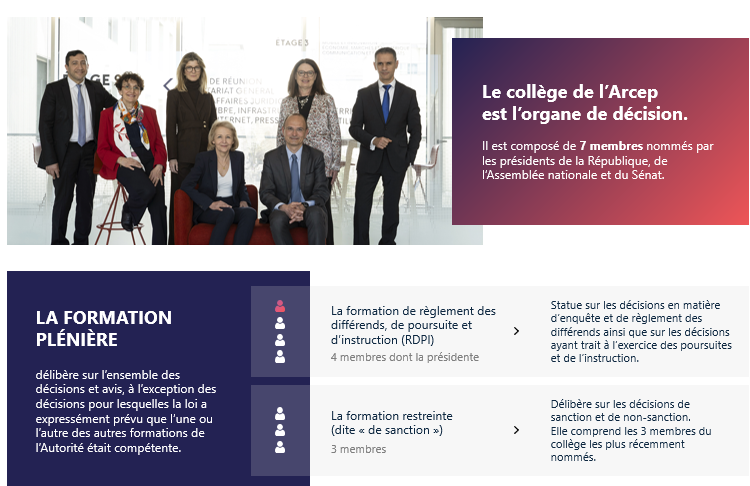In a judgement dated 4 June 2025, the Court of Cassation rejected the appeal filed by XpFibre against the Court of Appeal judgement that had confirmed the Arcep dispute settlement decision regarding the pricing terms and conditions governing Bouygues Telecom’s access to shared fibre-to-the-home (FttH) networks operated by SFR FTTH (renamed XpFibre).
Having been seised by Bouygues Telecom to settle a dispute it was having regarding the pricing terms and conditions governing access to the optical fibre lines operated by SFR FTTH (renamed XpFibre) outside of very high-density areas, within what are referred to as SFMD areas[1]. The Arcep Body responsible for settling disputes, legal proceedings and investigations (RDPI) issued a Decision on 5 November 2020[2]. This Decision required SFR FTTH to submit to Bouygues Telecom an amendment to their agreement on FttH line access in SFMD areas, reinstituting as of 1 February 2020, the co-financing rates in effect prior to that date, and whereby the price of passive line rental would not exceed €13.20 excl. VAT/month/line starting from 3 January 2020.
In a judgement dated 20 April 2023, the Paris Court of Appeal[3], seised by SFR FTTH, had confirmed the Arcep dispute settlement Decision.
In a judgement published on 4 June 2025, the Court of Cassation rejected the pleas put forward by XpFibre and confirmed the judgement of the Paris Court of Appeal. The Court of Cassation ruled that “the Court of Appeal correctly concluded that the RDPI Body did not fail in its duty of impartially”.
France’s Highest Jurisdiction confirmed the Court of Appeal judgement and validated the reasoning employed by the RDPI Body to assess the reasonable nature of the increase in the prices charged by XpFibre.
Lastly, the Court of Cassation rejected the argument that trade secrecy had been violated: “ARCEP did not ask the firm SFR FTTH to share its regulatory accounts or elements protected by trade secrecy with one of its competitors, but confined itself to requesting the cost-related information required to investigate the reasonable nature of its prices”.
In another judgement date 4 June 2025, the Court of Cassation rejected the appeal that XpFibre filed against the Court of Appeal judgement confirming the Arcep dispute settlement decision on the conditions governing operator Free’s access to SFR FTTH fibre networks in lower density areas covered by private initiative.
Also seised by Free to settle a dispute regarding the conditions governing its access to SFR FTTH optical fibre networks in “SFMD” areas[4], the RDPI body had issued a Decision on 17 December 2020[5].
In a judgement published on 20 April 2023[6], the Paris Court of Appeal, seised by SFR FTTH, had confirmed the Arcep dispute settlement Decision.
In a judgement published on 4 June 2025, the Court of Cassation rejected the pleas put forth by XpFibre and confirmed the judgement of the Paris Court of Appeal.
As with the aforementioned judgement issued that same day, the Court of Cassation ruled that “the Court of Appeal correctly concluded that the RDPI Body did not fail in its duty of impartially”.
France’s Highest Jurisdiction approved the reasoning employed by the RDPI Body on framing XpFibre’s ability to change its prices unilaterally. By way of reminder, the RDPI Body had enjoined XpFibre to offer Free a contractual mechanism, for the area covered by the dispute settlement, whereby, beyond a threshold set by the contract, the planned price change would be the subject of an amendment negotiated in good faith by both parties. The Court of Cassation found that this measure was “necessary and proportionate with the regulatory objectives”.
Lastly, the Court of Cassation ruled that the Court of Appeal had not reversed the burden of proof regarding the reasonable nature of SFR FttH cofinancing rates. The Court of Appeal had in fact noted that the rates had been contested by the firm Free “with the help of the “BLOM” shared optical local loop cost and pricing model” and that “in response, [the firm SFR FttH] had not supplied any proof regarding the costs that it had actually assumed”. The Court had concluded that the “values that the firm Free obtained through the use of this model constituted the only elements enabling ARCEP to assess the firm SFR FTTH’s deployment costs, required to assess the reasonable nature of its prices, namely the matter in dispute before this Court”.

Associated documents:
- Judgement of the Court of Cassation – Arcep dispute settlement regarding the pricing conditions governing Bouygues Telecom’s access to the shared fibre-to-the-home networks operated by SFR FTTH
- Judgement of the Court of Cassation – Arcep dispute settlement regarding the conditions governing Free’s access to SFR FTTH optical fibre network in lower density areas covered by private initiative
[1] These “SFMD” areas correspond to those locations where SFR FTTH acts as an infrastructure operator:
• Municipalities covered by SFR’s pre-existing deployments in those parts of the country where the Government has issued a call for investment letters of intent – called "zones AMII" in French (those municipalities that Orange handed over to SFR under a redivision agreement concerning these "zones AMII" signed in 2018 are therefore not concerned by this dispute);
• Those areas covered by the commitments that SFR made as part of calls for expressions of local interest (AMEL in French).
[4] Pricing requests pertain solely to the portions of “SFMD” areas covered by calls for investment letters of intent (“AMII areas” in French))..
